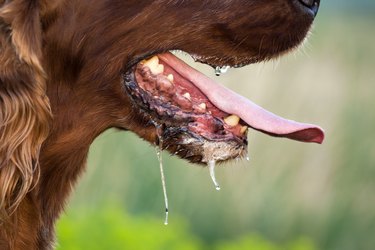
When you're a pet owner, the scariest thing is having something happen to your dog that you don't understand. As well as we know our dogs, we can't just ask them what's wrong. So when we observe something like our dog foaming at the mouth or frothing at the mouth, we have to look into why it's happening. Sometimes it's nothing serious, but other times, it may be a symptom of a disease or poisoning.
People observe a dog foaming at the mouth when there's an excess of saliva coming out of a dog's mouth. Many dogs drool, especially when they are eating, drinking, or licking themselves, but that's normal. A dog foaming at the mouth is much more noticeable with copious amounts of salivae that you can't help but notice. Rabies is the most common reason that first comes to people's minds when they think about dogs foaming at the mouth. According to Wag Walking, other symptoms will usually accompany the foaming.
Video of the Day
Video of the Day
It's probably not rabies foam
Some serious causes of foaming at the mouth in dogs are seizures or epilepsy. Non-serious causes could be a dog running and playing hard, and then breathing heavily to calm himself down. Observe your dog's behavior to try and tell what else may be going on. According to Canidae, rabies is a possibility, but modern vaccinations have made rabies much less common for domestic dogs.
Epilepsy in dogs can cause hypersalivation. At the same time, seizures may be an indication of a different medical condition such as kidney disease or liver disease. Distemper is another disease that can cause a dog to foam at the mouth, although not in every case. If you observe your dog's salivation intensified by heavy breathing, distress, agitation, or anxiety, or any other symptoms of something that is not your dog's typical behavior, see your veterinarian right away.
Dogs foaming at the mouth
If your dog were exposed to something like a pesticide it could cause hypersalivation and frothing at the mouth. Another cause could be an obstruction in her esophagus, such as a bone or other protrusion that impedes her swallowing. If your dog was sprayed in her face or mouth area by a skunk, it might cause foaming at the mouth. In this case, the smell would be a dead giveaway for what happened.
Consider other non-disease possibilities for foaming or frothing at the mouth such as dental issues, or she may have eaten something that tasted bad or was poisonous. The American Society for the Prevention of Cruelty to Animals lists some houseplants that are poisonous to dogs, as well as human foods such as chocolate, raisins, or nuts, which can severely disagree with dogs or even lead to toxicity if a large enough quantity is consumed.
Symptoms of canine pseudorabies
According to Pet MD, pseudorabies is a viral infection that can cause a reaction similar to rabies in dogs. It is uncommon, but serious if your dog is exposed to it. Pseudorabies symptoms include excess salivation (the hallmark of rabies, along with aggression) and an extreme itching that causes the disease to be named "mad itch."
A reaction to medication
Canidae says that licking pyrethrin, the pesticide that is a common ingredient in flea control products, can cause vomiting and salivation. Don't let your pets groom each other after applying flea control medication, and don't apply it to your dog in an area where he can lick himself afterward. A good spot to apply it is in between the shoulders where he can't reach. Poisoning due to medication or some other cause may often include other symptoms such as weakness, disorientation, lack of coordination, tremors or seizures, lethargy, shallow breathing, low blood pressure, excessive thirst, irregular heartbeat, or agitation.
Always check with your veterinarian before changing your pet’s diet, medication, or physical activity routines. This information is not a substitute for a vet’s opinion.